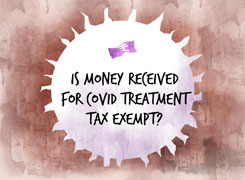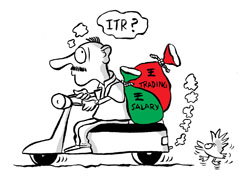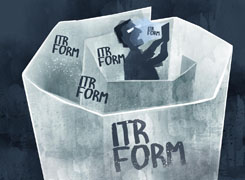
Hardik Parikh
Tax, Mutual Fund Expert
106 Answers | 24 FollowersFollow
He also holds an MBA degree from IIM-Indore.
Hardik, who began his career as an equity research analyst, founded his own advisory firm, Hardik Parikh Associates LLP, which provides a variety of financial services to clients.
He is committed to sharing his knowledge and helping others learn more about finance. He also speaks about valuation at different forums, such as study groups of the Western India Regional Council of Chartered Accountants.... more
Answered on Aug 31, 2023

Certainly! If you haven't withdrawn your Provident Fund (PF) amount from your previous company where the PF was deposited in a trust, you should be aware of the following:
1. Interest Accrual: As per the information available, if no contribution is received into a PF account for 3 consecutive years, the account will not earn any interest after those 3 years. This means that if your PF account has been inactive (no contributions) for the last 5 years, it would have earned interest only for the first 3 years out of those 5 years.
2. Tax Implications: If an employee has rendered continuous service for a period of five years or more, the accumulated EPF balance is exempt from tax. However, if you decide to withdraw the amount before completing 5 years of continuous service, there might be tax implications.
3. Recommendation: It's always a good idea to periodically check your PF account to ensure that it's earning interest and to be aware of any changes in rules or regulations. If you're unsure about the status of your PF account, you might want to contact the trust where your PF is deposited or consult with a financial advisor.
I hope this helps!
Answered on Aug 31, 2023

I understand your concern and the stress that such situations can cause. Mistakes in tax filings can have repercussions, and it's essential to address them promptly.
Regarding the notice from the IT department, the fact that you've received a notice means that the department has identified a discrepancy in your filings. The grievance filed with the Assessing Officer (AO) by ClearTax is a step in the right direction. The AO is responsible for assessing and reassessing income, and they have the authority to rectify any mistakes.
Given that you have evidence of the mistake and its rectification, there's a good chance that the AO will consider your grievance. However, the process might take some time, and there's no guarantee of the outcome. It's essential to keep all communication and documentation related to this issue handy.
As for getting your money back, if the AO acknowledges the mistake and rectifies it, you might be eligible for a refund. However, if the AO determines that the tax is rightfully due, you might have to pay the amount.
I hope this situation gets resolved in your favor soon. Remember, it's essential to stay proactive and keep pushing for a resolution.
Warm regards.
Answered on Aug 31, 2023

If your son is working in Saudi Arabia and is a non-resident of India, his tax liability in India would depend on his residential status as per the Income Tax Act of India. Generally, income earned outside India by a non-resident is not taxable in India. However, if he has any income sourced from India (like rental income from a property in India), then that income would be taxable in India.
It's always a good idea to consult with a tax advisor or chartered accountant in India to get a clear understanding of his specific situation and any potential tax obligations.
I hope this helps!
Answered on Aug 22, 2023

Given your annual CTC of Rs 17.6 lakh and your current investments, here are some tax-saving investment options you can consider for the financial year 2023-24:
1. Equity Linked Savings Scheme (ELSS): This is a type of mutual fund that not only helps you save tax but also gives you an opportunity to grow your money. They have a lock-in period of 3 years.
2. Public Provident Fund (PPF): You've mentioned planning for Sukanya Samriddhi for your daughter, which is a great choice. In addition to that, you can also consider investing in PPF. It's a long-term investment option that offers tax-free interest.
3. Unit Linked Insurance Plan (ULIP): Since you already have life insurance policies, you might want to look into ULIPs. They offer both insurance and investment under a single integrated plan.
4. National Savings Certificate: This is another safe investment option that you can consider.
5. New Pension Scheme (NPS): It's a voluntary, long-term retirement savings scheme designed to enable systematic savings. It is a mix of equity, fixed deposits, corporate bonds, liquid funds, and government funds.
6. Fixed Deposits: Some fixed deposits offer tax-saving benefits. However, the interest earned might be taxable.
7. Senior Citizen Saving Scheme (SCSS): Since you've mentioned senior citizen health insurance, if you or your family members qualify, SCSS can be a good option. It offers a good interest rate.
Remember, the key is to diversify your investments and not put all your money into one basket. It's also essential to keep in mind the lock-in periods, returns, and tax implications of each investment option.
I hope this helps!
Answered on Aug 08, 2023

Certainly! Here's a simplified guide on the treatment of Futures & Options (F&O) in Income Tax Return (ITR) filing:
1. ITR Form Selection: If you're involved in F&O trading, you should ideally file your returns using ITR-3.
2. Income Classification: Income from trading in futures and options is classified as non-speculative business income. This means that any profit or loss from F&O trading will be treated as business income/loss.
3. Reporting: All gains and losses from F&O trading must be reported in your ITR. This includes both speculative and non-speculative transactions.
4. Tax Audit: If your turnover from F&O trading exceeds the prescribed threshold or if you report a loss, you might be subject to a tax audit. It's essential to maintain proper books of accounts and get them audited if required.
5. Due Date: The last date for F&O Trading ITR Filing for non-audited cases is 31st July 2023.
6. Taxation Rules: It's crucial to be aware of the specific taxation rules applicable to F&O trading. For instance, expenses related to trading, like broker's commission, can be claimed as deductions.
7. Loss Reporting: If you've incurred a loss in F&O trading, it's essential to report it in your ITR. This loss can be set off against other business income, and if not fully set off, it can be carried forward to subsequent years.
I hope this helps!
Answered on Aug 08, 2023

Certainly, I can help you with your query regarding the income tax return systems for AY 2023-24 (FY 2022-23).
Yes, you can switch back to the old system for the submission of your income tax return for AY 2023-24 (FY 2022-23), even if you have filed under the new revised system for AY 2022-23 (FY 2021-22). The option to choose between the old and new tax regimes is available to individual taxpayers, and you can make this choice every year as per your convenience.
Under the old system, you can avail of various deductions, including the payment of interest on housing loans availed from a bank, as you mentioned.
Regarding the NRI deductees for rent, the standard TDS rate on rent paid to an NRI is 30% under section 195 of the IT Act. However, it's always advisable to consult with a tax professional or refer to the Income Tax Department's official guidelines for the most accurate and up-to-date information.
I hope this answers your question.
Best,
Hardik
Answered on Jul 31, 2023

I hope you're doing well. Based on your annual gross salary of 22 Lakhs and considering that you only pay House Rent, it's important to understand the benefits of both the old and new tax regimes.
In the old tax regime, you can avail of various deductions and exemptions, such as the House Rent Allowance (HRA), which can significantly reduce your taxable income. However, the tax rates are relatively higher.
On the other hand, the new tax regime offers lower tax rates but does away with most deductions and exemptions, including the HRA.
Given your situation, if your HRA forms a significant part of your salary and you are able to claim this exemption, the old regime might be more beneficial for you. However, this is a general suggestion and the actual benefit would depend on various factors including your exact salary structure and the amount of rent you are paying.
I would recommend consulting with a tax advisor who can understand your specific situation better and guide you accordingly.
Please note that this is a general advice and may not apply to your specific situation.
Best Regards
Answered on Jul 31, 2023
Answered on Jul 31, 2023

I understand your concern. As per the Income Tax Act in India, if your total income in a financial year does not exceed the basic exemption limit of Rs 3 lakh for senior citizens (60 years to below 80 years of age), then you are not required to file income tax returns.
However, if your total income, including the income of your children that you are dependent on, exceeds this limit, then you would be required to file a return.
I hope this helps.
Best regards,
Answered on Jul 29, 2023

The Income Tax Act of 1961, Section 139 (5), permits taxpayers to file a revised income tax return if they've made errors in the returns filed earlier. If the actual tax payable is not equal to the TDS, you need to calculate your income and taxes and file Income Tax Return (ITR) to claim TDS refund.
However, please note that you can only revise the return if the original one was filed on time. Belated returns cannot be revised.
Once your revised returns are processed, if there is any excess tax paid by you, it can be claimed as a refund. The refund will be credited to your bank account through ECS transfer.
I hope this answers your question.
Answered on Jul 29, 2023

Absolutely, as an Indian resident, you can indeed buy a property in the USA and open a bank account there. The Reserve Bank of India (RBI) allows Indian residents to remit funds abroad for the purchase of immovable properties under the Liberalised Remittance Scheme (LRS).
Under the LRS, an individual can remit up to USD 250,000 per financial year for any permitted current or capital account transactions or a combination of both. This limit would cover your property purchase as well as other expenses.
For opening a bank account, you may need to visit the bank in person in the USA. However, some banks might allow you to open an account online or via correspondence. You would need to check with the specific bank for their procedures.
Please note that while the RBI does not require you to seek its permission for such transactions under the LRS, you would need to adhere to the rules of the Income Tax Act in India. Any income from the property, such as rental income, would be taxable in India. Also, you would need to include the property in your wealth tax returns in India.
I would recommend consulting with a tax advisor or chartered accountant to understand the tax implications in detail.
I hope this information is helpful.
Answered on Jul 29, 2023
Answered on Jul 29, 2023

I understand your concern and it's great to see your proactive approach towards tax compliance.
As per the Income Tax Act, banks are required to deduct TDS on interest income when it exceeds Rs. 40,000 in a financial year (Rs. 50,000 for senior citizens). This is an automated process and banks follow this rule strictly.
However, if you wish to have TDS deducted even when your interest income is below Rs. 40,000, you may not be able to do so through the bank directly as their systems are designed to comply with the existing tax laws and automatically deduct TDS only when the interest income crosses the specified threshold.
That being said, you can still manage your tax liability effectively. You can calculate the tax on your interest income and pay it as Self Assessment Tax or Advance Tax, as applicable, through the Income Tax Department's e-payment facility. This way, you can ensure that your tax payment obligations are met in a timely manner.
Please consult with a tax advisor or chartered accountant for personalized advice based on your specific circumstances.
I hope this information is helpful.
Answered on Jul 29, 2023

I hope you are doing well. I understand your concern regarding the rental of your Pagri flat.
The Pagri system is indeed a unique and complex aspect of Mumbai's real estate. As per the information available, there is no specific clause in the Income Tax Act that prohibits the renting of a Pagri flat. However, the legalities surrounding the Pagri system can be quite intricate and may vary based on specific circumstances.
In your case, as you are the beneficiary owner and sole tenant of the flat, and you are declaring the rent as your income in your IT return, it appears that you are following due process. Your grandson is also providing all necessary documents to his company for HRA claim, which seems appropriate.
However, I would strongly recommend consulting with a legal expert or a chartered accountant who is well-versed in the Pagri system and its implications. This will help you ensure that you are in full compliance with all legal and tax requirements.
Stay healthy and safe.
Best regards
Answered on Jul 29, 2023

Answered on Jul 27, 2023

Firstly, I appreciate your diligence in managing your taxes. Now, coming to your query, the choice between ITR-1 and ITR-2 depends on the nature of your capital gains.
ITR-1, also known as Sahaj, is for individuals with income up to Rs. 50 lakh from salary, one house property, other sources (interest, etc.), and agricultural income up to Rs. 5,000. However, it does not allow you to report capital gains.
On the other hand, ITR-2 is for individuals and HUFs not having income from profits and gains of business or profession. It includes the provision to report capital gains.
In your case, since you have capital gains from the sale of mutual funds, even if it's less than the taxable limit, it would be more appropriate to file ITR-2. The TDS that has been deducted can be claimed as a refund in your return if your total income is below the taxable limit.
Please consult with a tax professional or chartered accountant to ensure you're following the correct procedure as per the latest tax laws.
Remember, it's always better to be accurate in your tax filings to avoid any future discrepancies or issues with the tax department.
I hope this helps.
Best Regards
Answered on Jul 27, 2023

I understand your confusion. Let me clarify this for you.
The interest earned on Fixed Deposits (FDs) is fully taxable. It is added to your total income and taxed at the slab rates applicable to your total income. The bank deducts TDS (Tax Deducted at Source) on the interest earned if it exceeds ₹40,000 in a fiscal year (the limit is ₹50,000 for senior citizens).
Now, coming to your specific situation, the bank is following an accrual system where the interest is calculated and accounted for each year, even if it is not paid out. This is why the bank has shown the interest in your account, even though it has not been credited to your account.
The bank manager is correct in saying that the tax is to be paid in the year the interest is accrued, not when it is actually received. So, you will have to include this interest income while filing your tax return for the Financial Year 2022-23.
I hope this clears up your confusion.
Answered on Jul 27, 2023

Firstly, congratulations on your upcoming retirement. It's a significant milestone, and I'm here to help you navigate the financial aspects of it.
Now, coming to your question about transferring your pension benefits to your wife. As per the Income Tax laws in India, any gift received from specified relatives, such as a spouse, is not treated as income. Therefore, it is fully exempt from income tax. So, if you decide to give your pension benefits to your wife as a one-time gift, there won't be any immediate tax implications for her.
However, there's an important aspect to consider. While the gift itself is tax-free, any income generated from this gift (for example, if your wife invests this amount and earns interest or dividends) would be clubbed with the income of the giver, i.e., you, and taxed accordingly. This is known as the clubbing of income.
In conclusion, gifting your pension benefits to your wife could be a good idea if the aim is to let her manage the funds. However, the income generated from the gifted amount would still be taxable in your hands.
I hope this clarifies your query.
Best,
Hardik
Answered on Jul 27, 2023

Choosing the right ITR form depends on the nature of your income. As a salaried individual, you can use either ITR-1 or ITR-2.
ITR-1, also known as Sahaj, is for individuals who have income from salary, one house property, other sources (like interest), and whose total income does not exceed ₹50 lakh during the financial year.
On the other hand, ITR-2 is used when an individual or a Hindu Undivided Family (HUF) has income from any source except income from profits and gains of business or profession. So, if you have income from salary and also capital gains, for example, from equity shares or mutual funds, then you will be required to file an income tax return using the ITR-2 form.
Remember, the choice of ITR form primarily depends on your sources of income. If you are unsure, it's always a good idea to consult with a tax professional.
I hope this helps!
Answered on Jul 27, 2023

Yes, you can claim a tax rebate for medical treatment under Section 80DDB of the Income Tax Act. This section allows for a deduction for expenses incurred towards the treatment of certain specified diseases.
However, there are some conditions to be aware of. For individuals below 60 years of age, the deduction can be up to Rs. 40,000 or the actual amount spent, whichever is less. Since you are 42 years old and your medical expenses are Rs. 57,000, you can claim a deduction of up to Rs. 40,000.
Please note that this is a general guideline and the actual conditions may vary based on your specific circumstances. It's always a good idea to consult with a tax advisor or chartered accountant for personalized advice.
I hope this helps!
Best regards
Answered on Jul 27, 2023

If there's a change in your gross income that impacts the details you've provided in Form 15G or 15H, you should inform your employer or the entity that's deducting the TDS. You may need to submit a new Form 15G or 15H with the updated income details.
Remember, these forms are used to declare that your income is below the taxable limit and that no TDS should be deducted from your income. If your income changes and it's now above the taxable limit, it's important to update this information to avoid any issues with the Income Tax Department.
Please consult with a tax advisor or chartered accountant to ensure you're following the correct procedures. This is just a general advice and the actual process may vary based on your specific situation.
I hope this helps!
Answered on Jul 27, 2023

I understand your query regarding the merger of shares and how to reflect it in your Income Tax Return (ITR).
When a merger happens, the shares of the merging company (in your case, Midtree) are usually exchanged for shares in the merged company (LTI Mindtree). This is generally treated as a transfer of capital assets, and the resulting capital gains or losses need to be reported in your ITR.
Here's a simplified explanation:
1. Cost of Acquisition: The cost of acquisition of the original shares (Midtree) becomes the cost of acquisition of the new shares (LTI Mindtree).
2. Period of Holding: The period for which you held the original shares is included in the period of holding of the new shares. This is important for determining whether the gains are short-term or long-term capital gains.
3. Capital Gains: If you sell the new shares, the capital gain or loss is calculated based on the selling price and the cost of acquisition (which is the cost of the original shares).
Remember to report these details in the appropriate section of your ITR (usually under the head 'Capital Gains').
Please consult with a tax advisor or chartered accountant to understand the specifics as per your individual situation. This is a general explanation and the actual process may vary based on various factors.
I hope this helps!
Best Regards.
Answered on Jul 27, 2023

Based on the information you've provided, your friend has Short Term Capital Gains (STCG) from shares amounting to Rs 95,000 and dividend income of Rs 12,000.
As per the tax rules in India for the financial year 2023, STCG from shares are taxed at a rate of 15%. However, if the total taxable income, including STCG, is less than the basic exemption limit (which is Rs 2.5 lakhs for individuals below 60 years), then no tax is payable.
In your friend's case, the total income (STCG + Dividend) is Rs 1,07,000 which is below the basic exemption limit. Therefore, he doesn't need to pay any tax on this income.
Regarding the dividend income, as of the financial year 2023, dividend income up to Rs 10 lakhs is exempt from tax. So, your friend doesn't need to pay any tax on the dividend income of Rs 12,000.
However, even if there is no tax payable, it is advisable to file an income tax return if the total income exceeds the basic exemption limit. In your friend's case, since the total income is below the exemption limit, he is not mandatorily required to file a return. But he may choose to do so for record-keeping purposes.
Please note that this is a general advice and the tax liability may vary based on individual circumstances. It's always a good idea to consult with a tax advisor for personalized advice.
I hope this helps!
Answered on Jul 27, 2023

I understand your concern. You're facing an error while filling out the ITR-2 form, even though you haven't opted for the new tax regime or claimed a deduction under Section 80U.
This error might be due to a system glitch or an unintentional entry in the form. Here's a simple way to address this:
1. Revisit the section of the form where you select the tax regime. Make sure you've selected the 'No' option for the new tax regime under section 115BAC.
2. Next, go to Schedule VI-A. In the section for deductions under Chapter VI-A, ensure that the field for Section 80U is left blank or zero, since you're not claiming this deduction.
3. Save the changes and try to validate and submit the form again.
If the error persists, it might be a good idea to consult with a tax professional or contact the Income Tax Department's helpline for further assistance. Remember, it's important to ensure all information is accurate to avoid any issues with your tax filing.
I hope this helps!
Answered on Jul 27, 2023

As an NRI earning interest from Fixed Deposits in India, you should file your income tax returns using Form ITR-2. This form is applicable to individuals and Hindu Undivided Families (HUFs) who have income from any sources except income from profits and gains of business or profession.
Please note that the interest earned on your FDs is taxable in India and you are required to report this income in your tax returns. Also, remember to check if there's any Double Taxation Avoidance Agreement (DTAA) between India and your country of residence to avoid being taxed twice on the same income.
I hope this answers your question.
Best Regards
Answered on Jul 27, 2023

I hope you and your family are in the best of health and spirits.
Coming to your query, the Pagri system is a unique form of tenancy prevalent in some parts of India, including Mumbai. In this system, the tenant has certain rights over the property, but the ownership remains with the landlord.
As per the information available, there is no specific clause in the Income Tax Act that prohibits the renting of a Pagri flat. However, it's important to note that in the Pagri system, only tenancy rights can be transferred, not the ownership of the property.
In your case, as you are the owner of the flat, you can certainly rent it out to your grandson. The rent you receive from your grandson would be considered as your income and should be reported in your Income Tax Returns. Your grandson can claim HRA (House Rent Allowance) benefit on the rent he pays to you, provided he satisfies the conditions laid down for claiming HRA.
However, I would advise you to consult with a tax consultant or a chartered accountant to understand the complete tax implications based on your specific circumstances.
I hope this information helps.
Stay healthy and safe!
Best regards.
Answered on Jul 26, 2023

Firstly, I would like to assure you that your loss in Futures and Options (F&O) trading can indeed be carried forward to the next financial year. As per the Income Tax Act, you can carry forward this loss for a period of 8 years.
Now, coming to your query about the documentation, since all your transactions were carried out digitally, you don't need to submit any additional physical documents as proof of your loss. However, it is crucial to report these losses in your Income Tax Return (ITR).
You should report this loss in ITR-3 as it is considered a business loss. While filling out the ITR, you need to provide details of your F&O transactions, including the sale value and purchase value.
Remember, even though the loss is not taxable, it is essential to mention it in your return. This allows you to claim a set-off against any future profits from your F&O trading.
I hope this answers your question. If you have any more doubts, feel free to ask.
Best Regards.
Answered on Jul 26, 2023

I understand your concern about receiving a notice under Section 143(1) even after paying your due taxes. This notice is a standard procedure from the Income Tax Department after your ITR has been processed. It's not necessarily a cause for concern.
The notice under Section 143(1) is an intimation which is sent to inform you about any discrepancies between the income details declared by you and the data available with the Income Tax Department. It could also be due to a miscalculation of tax or an incorrect claim of deductions.
If you have already paid your tax dues and are still receiving this notice, it could be due to a few reasons:
1. The payment you made has not been credited or updated in the system yet.
2. There might be a discrepancy or error in the tax calculation.
3. The Income Tax Department might not have accounted for some deductions or exemptions you claimed.
Here's what you can do:
1. Check the tax credit statement (Form 26AS) to confirm if your tax payment is reflecting there.
2. Cross-verify the computation of income and tax in the intimation received with your own calculations.
3. If there is a mismatch or error, you can file a rectification request online under the 'e-file' option on the Income Tax Department's website.
If everything is in order and you still receive the notice, I would recommend consulting with a tax advisor or chartered accountant who can help you understand the notice in detail and guide you on the next steps.
I hope this helps.
Best Regards
Answered on Jul 26, 2023

I understand your concern about the double taxation on your Fixed Deposit (FD) interest. Let me clarify this for you.
The Tax Deducted at Source (TDS) is a means of collecting income tax in India and is governed under the Indian Income Tax Act of 1961. When it comes to FDs, banks deduct TDS when your interest income exceeds a certain threshold in a financial year. As of now, this limit is Rs. 40,000 for non-senior citizens and Rs. 50,000 for senior citizens.
Now, coming to your question, the TDS deducted by the bank is not the final tax. It's just a part of the total income tax you're liable to pay for the year. The bank deducts TDS at 10% (if PAN is provided) on the interest earned, but your final tax liability could be at 5%, 20%, or 30% depending on your total income for the year.
So, when you file your Income Tax Return (ITR), you need to add the interest income from the FD to your total income for the year. The tax on this total income is then calculated based on the income tax slabs. If the total tax calculated is more than the TDS already deducted, you'll have to pay the difference. Conversely, if the total tax is less than the TDS, you can claim a refund.
For example, in your case, if your total income including the FD interest falls under the 30% tax bracket, you'll need to pay an additional 20% tax on the FD interest (30% total tax minus 10% TDS already deducted).
I hope this clarifies your doubt. Please consult with a tax advisor or chartered accountant for personalized advice based on your total income and tax slab.
Best regards.
Answered on Jul 26, 2023

I understand your concern and it's great that you're thinking about this in detail. Based on the information available, any income earned after the date of death from the assets inherited from the deceased is taxable in the hands of the legal heir.
So, if you're the legal heir, you should include this income inherited from the deceased in your own income while filing your own income tax return. This is in line with your proposed solution of including all interest earned after the date of death of the deceased in your income and mentioning it under the heading "income from other sources" in your ITR.
However, it's always a good idea to consult with a tax advisor or a chartered accountant to understand the specific implications based on your individual circumstances.
I hope this helps!
Answered on Jul 26, 2023

Based on the information you've provided, the individual you're referring to is considered a Non-Resident Indian (NRI) for tax purposes in India. As an NRI, the individual is only taxed on income earned or accrued in India.
The professional fees of 2.3 lakh earned for research work from an educational facility in India is taxable income. Since the income is from professional services, it should be reported under the head "Profits and Gains from Business or Profession" in the Income Tax Return.
As for the form to be used for filing the return, it would be ITR-3. This form is applicable for individuals and HUFs having income from profits and gains of business or profession. However, it's always a good idea to consult with a tax advisor or chartered accountant to ensure the correct form is used and all income is accurately reported.
I hope this helps!
Best regards.
Answered on Jul 25, 2023

Greetings! I hope you're doing well.
To answer your question, as an NRI who has taken a housing loan from your NRE account, you can indeed claim tax deductions on the interest and principal paid for the property.
Under the Indian Income Tax Act, you can claim deductions under Section 80C for the principal repayment of your home loan, up to a maximum limit of Rs 1.5 lakhs. Additionally, you can also claim deductions under Section 24(b) for the interest paid on your home loan, up to a limit of Rs 2 lakhs.
However, please remember that these deductions can only be claimed if you have taxable income in India. Since you mentioned that you have income from Indian sources and you file your IT returns every year, you should be able to avail these benefits.
I hope this information helps you in filing your tax return.
Answered on Jul 25, 2023

I understand your concern about the unreported short-term losses from foreign share trading for the Assessment Year (AY) 22-23. It's crucial to correct this oversight as it has a significant tax impact.
You can rectify this by filing a revised return for AY22-23. The Income Tax Act allows taxpayers to revise their return if they discover any omission or any wrong statement therein. However, please note that the revised return can only be filed if the original return was filed within the due date.
Also, remember that you can carry forward these losses to offset against future gains only if the original return was filed on time. So, if you had filed your original return for AY22-23 within the due date, you can carry forward the losses.
Please consult with a tax professional or chartered accountant to ensure that the revised return is filed correctly. This is a general advice and for a more detailed procedure, you may want to consult with a tax professional.
I hope this information is helpful.
Answered on Jul 25, 2023

I understand your concern about the mismatch between the income shown in Form 26AS and the income till the date of your father's demise. Here's how you can handle this situation:
1. While filing the return for the deceased, you should indeed include the income earned till the date of death. This is as per the Income Tax Act of 1961.
2. Regarding the TDS, it is deducted based on the estimated income for the entire year. However, since your father passed away during the year, the income earned till the date of his death is less than the estimated annual income.
3. In such a case, you can claim a refund of the excess TDS deducted while filing the income tax return. The Income Tax Department will process this refund.
4. If there is a scrutiny by the Income Tax Department, you can provide the necessary documents and explain the situation. The department is aware of such circumstances and they will understand the bifurcation.
5. It's always a good idea to consult with a tax advisor or chartered accountant to ensure that the tax return is filed correctly.
I hope this clarifies your doubt.
Answered on Jul 24, 2023
Answered on Jul 24, 2023

I understand your concern about the notice you've received regarding a defect in your Income Tax Return for AY 2023-2024. As an NRI working in Saudi Arabia, it's crucial to ensure your tax filings are accurate.
The notice you received typically means that there might be some discrepancies or missing information in the return you've filed. This could be due to a variety of reasons such as incorrect reporting of income, deductions, tax credits, etc.
Here are a few general steps you can take:
1. Review the Notice: The Income Tax Department usually provides a reason for the defect in the notice itself. Review it carefully to understand what the issue might be.
2. Check Your ITR Form: Go through the ITR form you've filled out. Make sure all the information is accurate and complete. Pay special attention to the sections related to foreign income, as this is a common area where mistakes can occur for NRIs.
3. Rectify the Defect: Once you've identified the issue, you can rectify it by logging into the e-filing portal. You'll need to revise your return with the correct information and submit it again.
Please note that this is general advice and the exact steps might vary depending on the specifics of your case. If you're finding it difficult to rectify the defect yourself, it might be beneficial to seek professional help. As a tax professional, I can certainly assist you with this on a chargeable basis.
Remember, the deadline for rectifying the defect is August 3, 2023. It's important to act promptly to avoid any further complications.
I hope this helps! If you need further assistance, feel free to reach out.
Answered on Jul 24, 2023

Based on the details you've provided, your total income after deductions is 46 lakhs which is under the limit of 50 lakhs. However, it's important to note that the requirement to file Schedule AL is based on your net income after all deductions under Chapter-VI-A.
Schedule AL is a part of the Income Tax Return (ITR) that requires the disclosure of all assets and liabilities held by a taxpayer at the end of every financial year. It is mandatory to fill this schedule if a taxpayer's net income exceeds 50 lakhs in a particular financial year.
In your case, since your net income after deductions is less than 50 lakhs, you are not required to file Schedule AL. However, if there are any changes in your income that increase it above this limit, you would then need to file Schedule AL.
I hope this helps!
Answered on Jul 24, 2023

Based on the information available, the survival benefit you're receiving from your Birla Sun Life Insurance Income Assured 2017 Term 15 Years Pay 05 Years policy is generally not taxable. This is because any sum received from a life insurance policy, including maturity proceeds and death benefits, is usually tax-free, subject to certain conditions.
However, it's important to note that there was a change proposed in Budget 2023. If the aggregate annual premium of a life insurance policy exceeds Rs. 5 lakh, the maturity amount may be taxable. So, if your annual premium is more than Rs. 5 lakh, you might have to pay tax on the maturity amount.
Remember, these are general guidelines and tax laws can change. It's always a good idea to consult with a tax advisor or professional to understand the specific tax implications for your situation.
I hope this helps!
Answered on Jul 24, 2023

Based on the information available, it appears that you can indeed adjust your Long Term Capital (LTC) loss against LTC gains in the same financial year.
In your case, the LTC loss of Rs. 3.5 Lacs from the sale of a flat can be adjusted against the LTC gain of Rs. 4 Lacs from the redemption of equity shares and mutual funds. This leaves you with a balance LTC gain of Rs. 50,000.
As per the Income Tax Act, LTC gains up to Rs. 1 Lac are exempt from tax. Therefore, your balance LTC gain of Rs. 50,000 should be exempt.
Regarding the limit of LTC loss adjustment, there doesn't appear to be a specific limit of Rs. 2 Lacs for adjusting LTC loss against LTC gains. However, any unadjusted LTC loss can be carried forward to subsequent years and set off against future LTC gains.
Please note that this is a general interpretation based on the available information. For a more accurate understanding of your tax liability, I would recommend consulting with a tax professional or a chartered accountant who can provide advice based on a comprehensive understanding of your financial situation.
I hope this helps!
Answered on Jul 23, 2023

I understand your situation and I'm here to help. Based on the details you've provided and the current tax laws in India, here's what you need to know:
1) The amount you've spent on acquiring the housing plot can indeed be considered for the utilization of your capital gain. As per the Income Tax Act, if you reinvest the capital gains from the sale of a property in buying a new property or constructing a new house, you can claim tax exemption on the capital gains.
2) The amount you need to keep in the Capital Gain Account Scheme (CGAS) would be the remaining amount after deducting the cost of the plot from the capital gain. In your case, if you've already spent Rs. 11.00 Lakh on the plot, you would need to keep Rs. 4.00 Lakh (Rs. 15.00 Lakh - Rs. 11.00 Lakh) in the CGAS. This amount should be utilized for the construction of the house within the specified time period, which is 3 years from the date of sale of the original property.
Answered on Jul 23, 2023

I understand your concern about the tax implications of your separation compensation.
Under Section 10(10C) of the Income Tax Act, any amount received by an employee on voluntary retirement or separation is exempt from tax, subject to a maximum limit of Rs. 5,00,000. So, yes, you can show your compensation under this section to get a tax benefit.
However, please note that if you claim exemption under Section 10(10C), you will not be eligible for relief under Section 89. Section 89 provides relief when salary or compensation is received in arrears or advance, but it cannot be claimed in conjunction with the exemption under Section 10(10C).
So, in essence, you can get the benefit of either Section 10(10C) or Section 89, but not both. I would recommend consulting with a tax advisor to understand the best approach for your specific situation.
I hope this helps!
Answered on Jul 23, 2023

1. Filing Tax Return for Your Father: As per the Income Tax Act in India, the legal heir is responsible for filing the income tax return on behalf of the deceased person. This return should include the income earned by your father until the date of his death, which includes the Pension, FD, SCSS, and Mutual Fund incomes. If the total income is below the taxable limit, you can claim a refund for the TDS deducted.
2. Interest Earned After Death: The interest earned after your father's death on his investments (like FD, SCSS, and LIC) is considered your income. You should include this in your income tax return and pay the necessary tax.
Remember, to file your father's return, you need to register yourself as a 'Legal Heir' on the Income Tax website.
Answered on Jul 23, 2023

I understand your query about the tax exemption on the gratuity amount you're receiving as part of your monthly salary.
Gratuity is a benefit given by the employer to employees. As per the recent amendment, gratuity is now tax-exempt up to Rs 20 lakh, which is an increase from the previous limit of Rs 10 lakh. This comes under Section 10(10) of the Income Tax Act.
However, it's important to note that if an employee receives gratuity during his service, then it is fully taxable as income under the Income Tax Act, 1961. The exemption applies when the gratuity is received at the time of retirement or termination, not during the service period.
I would recommend consulting with a tax advisor or a chartered accountant to understand how this applies to your specific situation and to plan your taxes accordingly.
I hope this information is helpful to you.
Best Regards.
Answered on Jul 23, 2023

Based on the information provided and the tax laws in India, here's how each individual can claim deductions in their tax returns:
1. Mrs. X: As a person with severe paralysis, Mrs. X can claim a tax deduction under Section 80U of the Income Tax Act. This section provides tax benefits to individuals who suffer from certain disabilities. The deduction amount for a person with severe disability (80% or more) is Rs. 1,25,000. Mrs. X can claim this deduction for the Rs. 70,000 she spends on her medicines from her own income.
2. Sons A & B: Both sons can claim a tax deduction under Section 80DDB for the amount they spend on their mother's medical treatment. This section provides a deduction for the amount spent on the treatment of specified ailments, which includes neurological diseases where the disability level is 40% and above. The maximum amount that can be claimed under this section is Rs. 40,000 (Rs. 1,00,000 in case of severe disability). Each son can claim this deduction for the Rs. 55,000 they each spend on their mother's medicines.
3. Husband Y: Mr. Y can claim a tax deduction under Section 80DD for the amount he spends on the maintenance of his wife. This section provides a deduction for the expenses incurred on the maintenance and medical treatment of a dependent who is a person with a disability. The deduction amount is Rs. 75,000 for disability and Rs. 1,25,000 for severe disability. Mr. Y can claim this deduction for the Rs. 1,50,000 he spends on his wife's maintenance.
Please note that these deductions are subject to the conditions specified in the respective sections of the Income Tax Act. Also, the disability should be certified by the medical authorities as specified in the Act.
Answered on Jul 23, 2023

Firstly, congratulations on your award from the Department of Science and Technology. It's indeed a great achievement.
Coming to your query, the fellowship you receive as part of the award is exempt from income tax under Section 10(17A) of the Income Tax Act. However, the ITR-1 form does not have a specific field to report this exemption.
Here's what you can do:
1. You need to report this income under the head "Income from Other Sources".
2. Then, you can claim the exemption under Section 10(17A) in the 'Exempt Income' section of the ITR form.
3. In the 'Exempt Income' section, select 'Others' and specify the details of the exemption, i.e., fellowship received under Section 10(17A).
Answered on Jul 23, 2023

I understand your query regarding the Professional Update Allowance. As per the current tax laws in India, there isn't a specific section that allows a deduction for Professional Update Allowance for government employees under the new tax regime.
However, certain allowances are exempt under Section 10(14) of the Income Tax Act, but these are specific and subject to certain conditions. It's important to note that the new tax regime, introduced in the 2020 budget, offers lower tax rates but requires taxpayers to forego most deductions and exemptions.
I would recommend consulting with a tax advisor or your department's finance team for more specific guidance based on your individual circumstances.
I hope this helps!
Best,
Hardik
Answered on Jul 23, 2023

Your mother's intention to distribute her investments among her children is a thoughtful gesture. Here's a simple explanation of the process and its tax implications in India.
1. Gifting Process: Your mother can gift her shares and mutual funds to her children. This can be done through a gift deed or even a simple letter stating her intention to gift the shares. The letter should mention the details of the shares/mutual funds, the name of the recipient, and the relationship between the donor (your mother) and the donee (her children).
2. Tax Implications for the Donor (Your Mother): In India, any gift given by a parent to their child does not attract any tax, irrespective of the value. So, your mother will not have to pay any tax when she gifts these shares and mutual funds to her children.
3. Tax Implications for the Donee (Her Children): The children will not have to pay any tax upon receiving the gift. However, if they decide to sell these shares or mutual funds in the future, they will be liable to pay tax under the head 'Income from Capital Gains'. The tax rate will depend on whether it's a short-term or long-term capital gain.
4. Gift Deed: Although it's not mandatory, it's advisable to execute a gift deed for each child. This will serve as a legal document and can be useful in case of any disputes in the future.
I hope this helps!
Answered on Jul 23, 2023

I understand your concern about the delay in receiving your Income Tax refund. Generally, the Income Tax Department processes refunds within 20-45 days after the Income Tax Return (ITR) has been processed. However, the exact time can vary and it may take up to 90 days or even longer in some cases.
If you have not received your refund within this period, I would recommend you to check the status of your refund online. You can do this by visiting the official website of the Income Tax Department. If the status shows as 'Refund Paid', but you have not received it, there might be an issue with the bank details you have provided. In such a case, you should contact your bank or the Income Tax Department for further assistance.
Please note that the processing time can also depend on the accuracy of the details provided in the ITR and the time of the year you have filed the return. The sooner you file your ITR, the earlier you are likely to receive your refund.
Best Regards.
Answered on Jul 23, 2023

Yes, the interest earned on Fixed Deposits (FDs) and savings accounts is indeed taxable. However, there are certain provisions in the Income Tax Act that provide some relief to senior citizens.
As per Section 80TTB of the Income Tax Act, senior citizens, those who are 60 years or above, can claim a deduction of up to Rs 50,000 from their gross total income. This deduction is applicable on the interest earned from FDs, savings accounts, and recurring deposits.
So, if the total interest income earned by a senior citizen in a financial year does not exceed Rs 50,000, then it will not be subject to tax. However, if the interest income exceeds Rs 50,000, then the amount over Rs 50,000 will be taxable.
I hope this clarifies your query.
Best Regards,
Hardik
Answered on Jul 23, 2023

The commission you received from ICICI Prudential Life Insurance is considered as your income. The amount that will be included in your income for tax purposes is the total amount before the GST deduction.
So, if they have credited an amount to your account after deducting 18% GST, you need to calculate the original amount before GST was deducted. This can be done by dividing the credited amount by 0.82 (as 18% GST implies that 82% of the original amount is what you received).
For example, if you received Rs. 10,000 in your account after GST deduction, the original amount before GST deduction would be Rs. 10,000 / 0.82 = Rs. 12,195.12 approximately. This is the amount that will be considered as your income.
Please note that there is also a TDS (Tax Deducted at Source) of 5% applicable on insurance commissions as per ICICI Prudential's TDS Rate Chart. This TDS will be deducted by the company before crediting the commission to your account.
I hope this clarifies your query. However, tax laws can be complex and it's always a good idea to consult with a tax advisor or chartered accountant for personalized advice.







